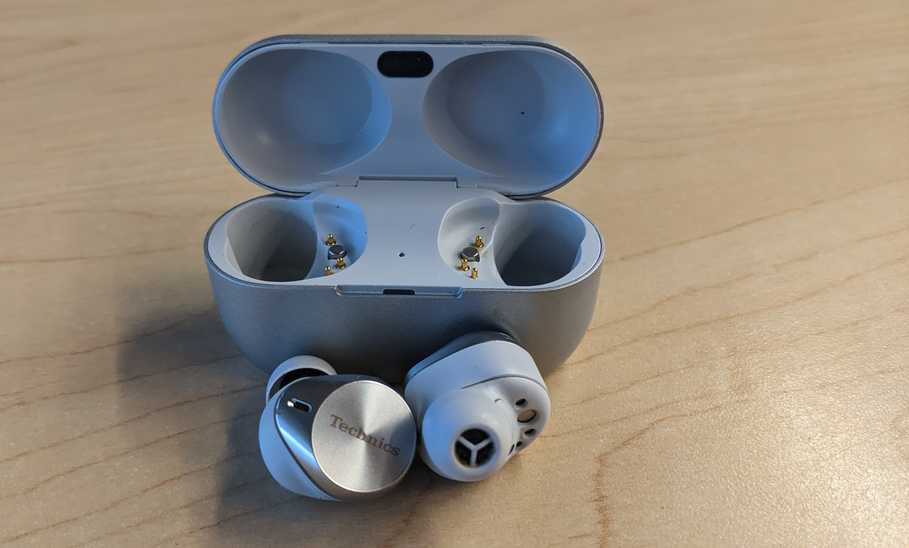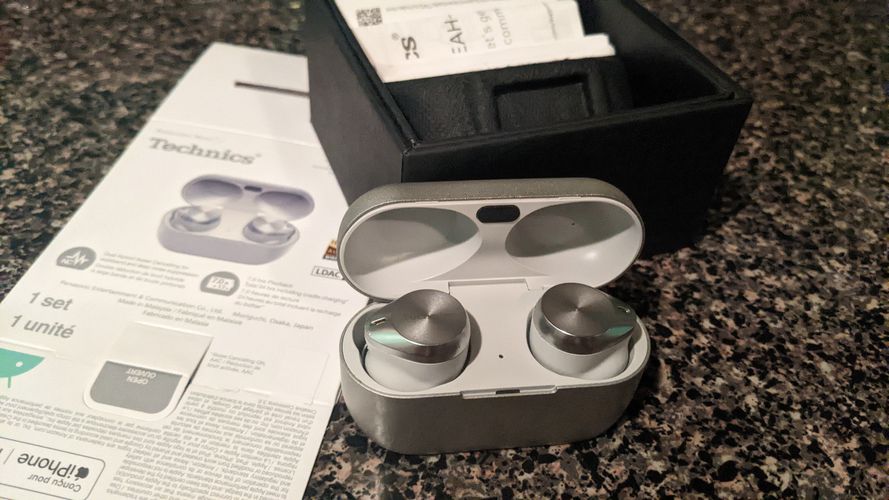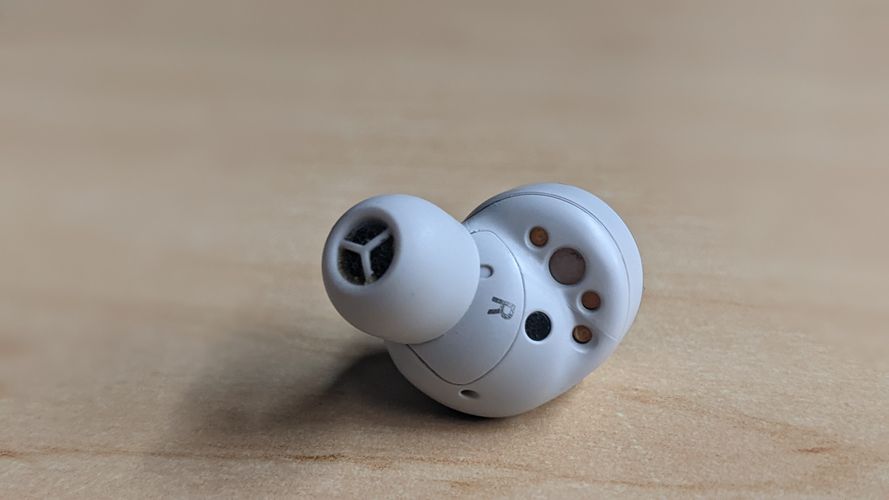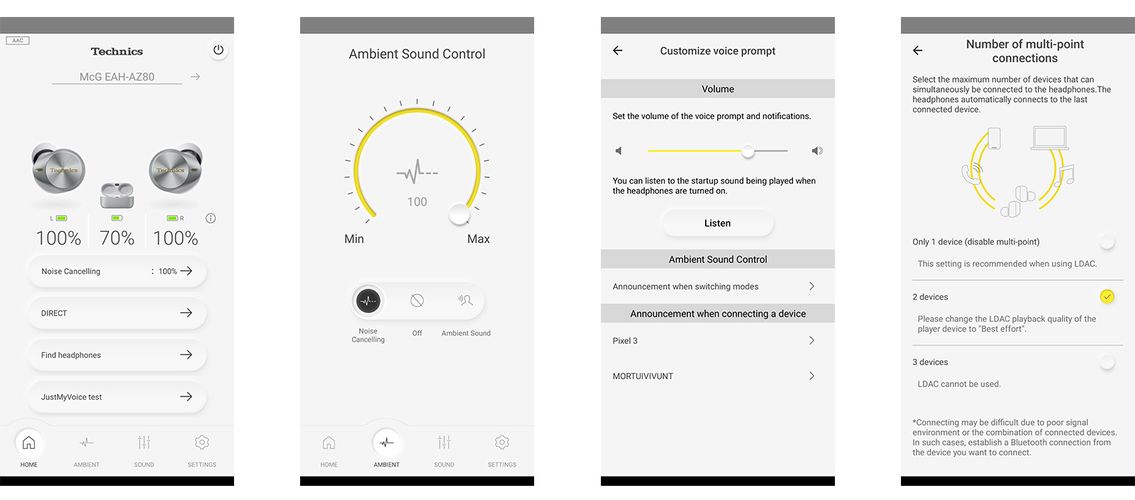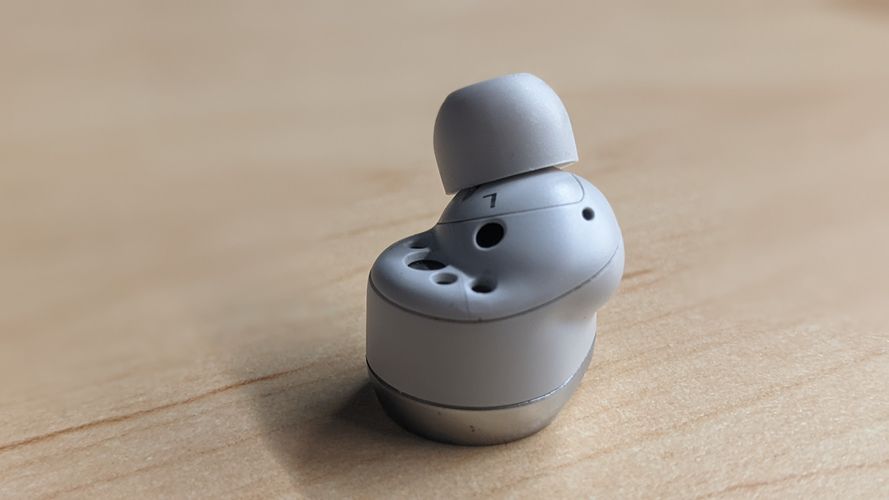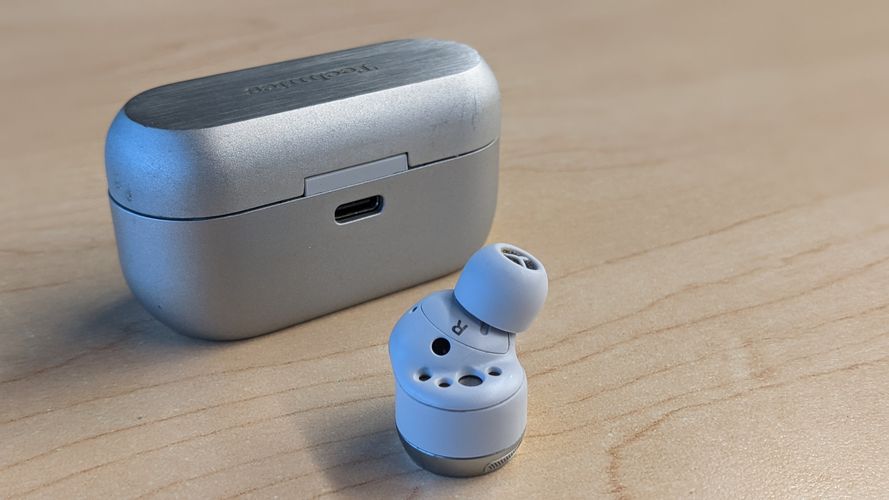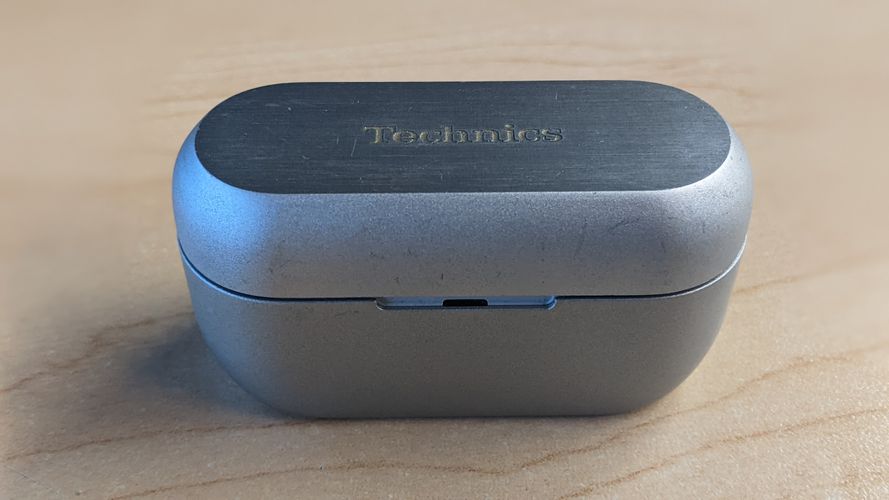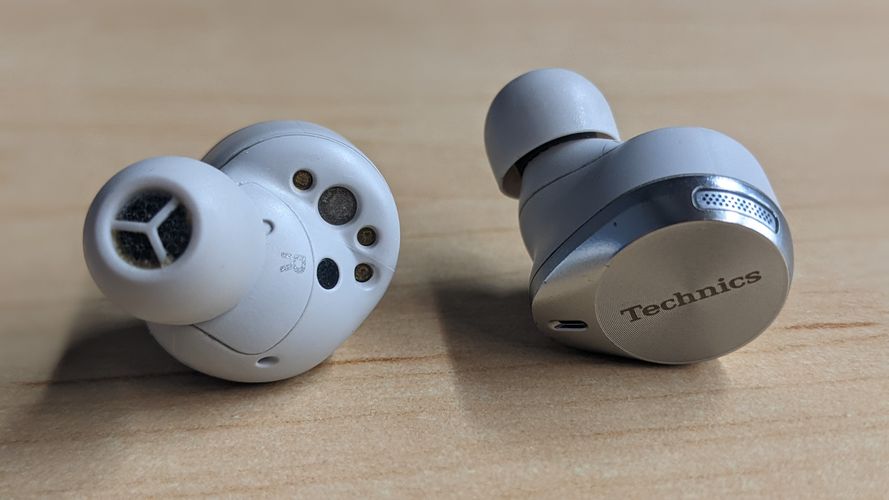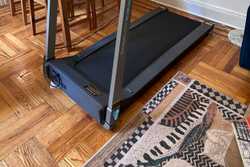Wireless earbuds are still fairly new, but they’ve come far in such a short time—compressing technology that has turned headphones from once tinny, fuzzy, lightweight devices or expensive, heavy, and even painful producer-grade quality equipment, into something comfortable, lightweight, and high-quality. This transformation is even more marvelous when you see it miniaturized, and boy do the Technics EAH-AZ80 earbuds get it right. With minor exceptions, these noise-canceling, true multichannel headphones serve up an easy, fluid user experience, and consistently terrific sound quality—no expertise required. Let’s dig into the details.
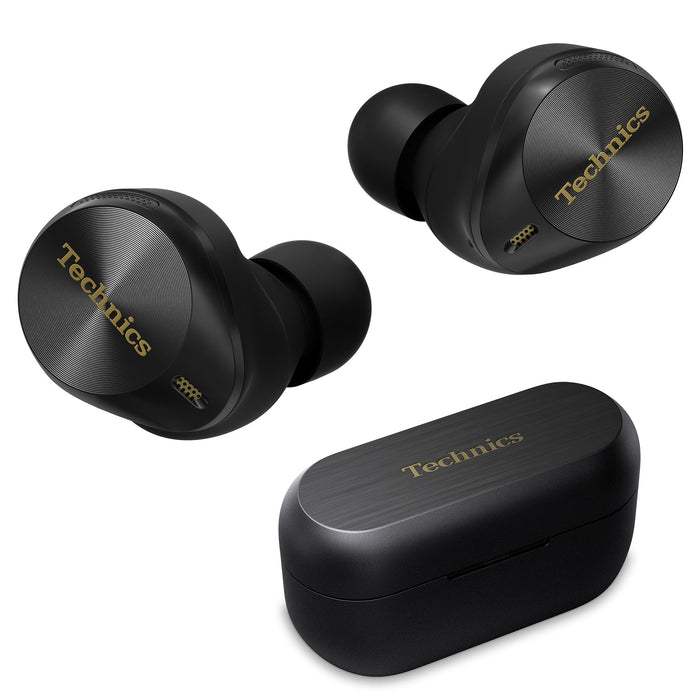
Premium Hi-Fi True Wireless Earbuds with Noise Cancelling EAH-AZ80
Unboxing and first impressions
The Technics EAH-AZ80 earbuds arrived so ready to rumble, they paired immediately to my phone simply by taking one out of the case. I had to authorize it of course, but it's been a lifetime of Bluetooth devices trying and failing to detect one other, and this is a good development. Security concerns aside, it’s neat that we’re finally at a point where the EAH-AZ80 noticed that it's a few inches away from my phone and not paired to anything else. So that was a nice improvement… while it lasted. Pairing with older devices, in this case a mid-’10s HP running Windows 10, proved more arduous, though I’m inclined to blame the recipient more than these headphones. If you do have trouble connecting, there's a QR code on the box that will speed the plow.
So far we're off to a solid start. Putting them in, I even get a dropdown notice I've never seen telling me the respective power levels of each earbud and the case. No software installation required on my part. This is pretty wild stuff. This is the future we thought we'd have 20 years ago.
There’s not much point to the quick start guide when these headphones are self-establishing, but I do keep it handy for the easy reference. Speaking of which, the larger manual comes with a QR to its own digital copy but it's fairly brief and mainly includes technical info and warnings not to throw these things in the oven. So noted.
Pros and cons
Pros:
- Great sound just shy of fully rich
- Smooth UX journey for the most part
- Beautiful design
- Lightweight and comfortable
- Excellent touch controls
- Feel completely worth their high price tag
- Pair effortlessly
- App has many customizable options
Cons:
- Manual pairing options inaccessible
- User guide isn’t fully helpful after updates
- Charge time is longer than comparable buds
- Noise cancellation could be stronger
- App design buries most useful options amid noisy navigation
Price
At $299, you’re going to feel this purchase, but you won’t have to fear buyer’s remorse. Not everyone should invest this much in noise canceling headphones—you can approximate much of what makes these great on a budget—but for those who can spare it, you’re unlikely to find too many comparable returns on expenditure out there.

Premium Hi-Fi True Wireless Earbuds with Noise Cancelling EAH-AZ80
Specifications
Drivers
Bucking the popular myth that bigger is better, this pair of earbuds uses 10 mm free-edge dynamic drivers, half the size of even the lower end of the typical driver. By forgoing the surround, this Technics trademark feature aims to deliver a cleaner listening experience.
Active noise cancellation
Yes, in balance with ambient mode. You can take either to 100%, and when switching modes, its opposite will have moved to the same level of intensity. Technics also lists something called attention mode for conversation, although this seems to have vanished with app updates if it was ever there.
Battery life and charging
Technics says the EAH-AZ80 will give 4.5 to 7 hours playback time in a single use with 16 to 24 hours total use from a fully charged case completely discharged in repowering the earbuds a few times.
The earphones charge in 2 hours from a complete discharge, and a fully charged cradle can repower the earbuds twice. That sounds like quite a while, but consider how unlikely you are to discharge these before holstering them, and you’ll almost never flirt with zero. Your ears will need a break first.
You can charge it wirelessly with a devoted charger sold separately, or use the Qi standard you may already own. This takes about 3.5 hours from zero.
Size and weight
The buds are 7 grams apiece, and the case is 50 grams, for a total of 64 grams in your pocket. That’s just over three human souls!
Connectivity
As noted at the unboxing, the Technics propelled themselves into my phone’s environment. Laptop connectivity proved more challenging the first time and outright ongoing difficult after an uninstall and second attempt weeks later. While it performed ably in between those two, and I’m willing to blame my CPU’s Bluetooth receiver for the second, it doesn’t erase the labor of the first attempt.
Technics’ terse instructions recommend you connect using its app and selecting the device you want, rather than selecting the headphones on the device itself. Great if my computer were appearing in the app, but I’m adrift when it doesn’t. It seems that the earbuds are so adept at connecting, there’s not much recourse or instruction when they don’t: smart features, dumb system. It’s irritating that I paired these successfully to my computer once and can’t replicate it a second time because neither device wants to detect the other. There’s no actual section to find devices in the app, and the connection mode settings simply switches priorities: sound quality versus connectivity.
Weirder still, my phone decided to launch straight into playing where my music left off, so convinced it was connected to the EAH-AZ80 that it said as much on the screen. However, it was using my phone speakers for the other library patrons’ annoyance. It’s like these got worse after the app updated? A stern reversal of my experience reviewing Bowers & Wilkins’s Pi7 S2. And yet, these glitches aside, they still satisfy throughout testing. Just beware it might now require a touch extra work.
Frequency range
The Bluetooth operates in the 20 Hz to 40 kHz range (LDAC 96 kHz/990 kbps).
Waterproofing
The AZ80 buds are rated IPX4. The case is not waterproof for submersion, though it’s unlikely any amount of water splashing on it will cause much damage.
Key features
Multipoint
These Technics AZ80 earbuds can connect to three devices simultaneously—no switching required. It’s true multipoint. Multipoint works fluidly and even remembers the previously stored volume level for each device—I thought for a moment it hadn’t worked only to realize my laptop, which I had just adjusted to play normally in the privacy of my office, was still muted from the Technics’ point of view from testing it the night before.
App
When I started reviewing, this was a nice, simple, little app. Along the way it gained a huge boost in functionality and options, which is appreciated, but does make it more challenging to navigate settings in a useful way. Still, look who can play with audio levels now, Ma.
Battery and charging
If you wear these during a marathon, you stand a decent chance of crossing the finish line without them cutting during your big power-ballad pump song for the final sprint. (It’s AC/DC’s “Thunderstruck,” by the way. You probably thought you’d be juiced by the themes from Rocky or Chariots of Fire, but trust me here.) As someone who actually does go on very long runs, I found them to perform ably at a comparable discharge rate to what Technics said, and the dropdown window letting me keep one eye on them is appreciated. You joggers and cyclists will run out of juice before these do.
Charging time is supposedly two to three hours depending on whether you're just charging the buds or charging the cradle at the same time. I found even taking down the battery case pretty near to zero (the cradle’s LED will warn you) got me faster charging times than that, but perhaps it wasn't as close as I thought.
Sound
Far past even recent developments in earbuds, the AZ80 are a joy for listening to either music or podcasts. Crystal clear sound shows off with a flourish the first time you put them in. While I do think my recent review of the Bowers & Wilkins Pi7 S2s delivered slightly fuller-bodied audio, the AZ80 earbuds also offer something Pi7 doesn’t: adjustable levels, meaning you can create the sound experience of your choice, and possibly even surpass the default playback of that stock-richer pair of headphones.
So while you can find earbuds with slightly better audio unadjusted, they will cost more, might not deliver the wealth of options and satisfying out-of-box experience, and to a degree miniscule enough that you should probably just upgrade to full headphones if you still feel something is missing.
And I should stress: These offer great sound. I played a song from the 50s back to back with an RJD2 single barely a month old, and both delivered to the top of their production. Even the limitations of the old recording studio came through as part of the sound and not annoyingly fudgy or poppy.
Adaptive sound control
Here I have to ding the AZ80 a smidge. They won’t magically transform the worst of city life, failing to do much to block the omnipresent Subway Guy playing (though not blasting) loud music, and singing along. At the same time, the automated train announcements cut right through my music. Three rapid-succession failures, although hearing train announcements is appreciated and useful, so this could be counted as a positive.
Having met their limits on the NYC subway, they do hold up well as earbuds for running next to a roadway (they’re great for focus, but do require more visual awareness of bikes and cars). I like that these Technics are able to block more noises listening to music above comfort level but not painfully loud: so even if they can’t prevent the worst of it, they also don’t require any sacrifice to continue enjoying it at preferred levels.
Ambient sound is smooth and natural, and even works like an amplifier of far-away sounds you might struggle to hear with the naked ear. For better or for worse, you have a directional mic in your head now.
Bluetooth range
The Bluetooth is effective about as far as you’d be comfortable leaving your phone unattended anyway, but I left it in my front yard and walked up the block. I made it about four houses before audio got patchy. Line of sight definitely plays a part in this; at my back fence, I could field great audio from the front door, but caught static and dropped sound when I moved port or starboard so the phone had to broadcast through cement and brick.
Microphone
Microphone quality was comparable to, and perhaps even better than, my phone’s baked-in one. A half-hour call on the AZ80 suffered no problems, whereas 10 minutes on my phone’s speaker made a call arduous. Did I just extend my phone’s lifespan through prosthetic upgrades?
Comfort
You’ll have to find your perfect earbud size, but even when loose, the AZ80 pair performs admirably. Buds in a variety of sizes from extra small to small to medium to large and extra large are included, with the medium stock in place.
Built-in voice
Voice assistant can be accessed with a long press on the right earbud, and it performs to about the same degree of success and failure as when I simply say, “Hey, Google” to my Pixel in an open-air query. In fact, I may be slightly more assured of a reply, provided I’m willing to wait for my Android 12’s increasingly slow response times.
Voice calling performance
The phone call quality came through a little flat, though it's hard to say if this is simply the phones themselves. I can’t recall ever enjoying call quality on my phone directly, so these earbuds may be a casualty of fairly low-quality microphones and speakers on even the better phones out there.
Design and build quality
Style
A sleek plastic cradle in the style of polished aluminum, midnight blue, or black completes the retro-futuristic style of the earbuds themselves. These look like the early 80s vision of tomorrow, peeling away from wood paneling into a sterile techno-aesthetic. While my test unit’s gunmetal gray is sharp and sleek, it does shoot broad of too much personality. There might be a bit of a deliberate throwback vibe to the early 80s gray and shapes on so many cassette players. It's got a little more update though. I suppose these are the headphones you would wear with your suit on the way to Wall Street.
All in all, these were made to perform for everyone, not draw second looks à la the AirPods’ minimalist debut.
Comfort
Their lightweight and thoughtful shape ensures these earbuds are comfortable for hours, without leverage peeling them out of your ears. Weight is directed toward the point where they sit naturally. Do experiment with different bud sizes, though.
Controls
The versatility of the EAH-AZ80’s controls is one of their sharpest selling points. It only takes a couple minutes’ practice to grow comfortable with the basics. Then you can easily navigate volume, tracks, short jumps, play/pause, pairing, and noise cancellation. The designers used conductive control to its full potential to give you mastery of your playback and call management with an array of taps and holds. There are additional controls for noise cancellation versus ambient sound and the program switches over to something similar for phones. It’s impressive how much functionality can be wrested from four basic movements across two units and two modes. Barring swipe detection, there’s not really room or response to add more here.
And at some point in my review, they added a “pause on pull-out” operation, or else my units just decided to start working that way. I wasn’t going to deduct points for not having this function, but I was going to note that I wished it existed, and behold, it has arrived.
Portability
While the ratios of length, width, and height give the cradle a boxier shape than fully sits well in tight pockets, given the achievements involved here, it’s a negligible discomfort. It’s small enough to sit in almost any pocket, and light enough not to draw notice but for its geometric volume. (You will definitely notice its high-marks audio volume.)
Build quality
The earbuds themselves are remarkably scrappy whether you’re looking at how surprisingly light they are or how cleanly they perform. While there’s room for warmer, more full-bodied audio, the EAH-AZ80s escape any metallic buzzing or otherwise squashing music quality, and you can adjust levels to your tastes in the app, which is greatly appreciated.
Externally, they’re tough, too. At one point, one earbud popped out on a run and bounced on the sidewalk, but I recovered it to find no scuffing. After fitting to a different silicone bud, loose headphones were no longer a problem.
Case
While the exterior plastic could stand a little more resilience to scuffs and scratches, it’s strong where it counts, with a tight lid that snaps shut and stays there, yet opens easily with a flick of the thumb. Having had cheaper cradles that took more cosmetic damage but were shaped so you needed two hands to open them, I’ll definitely take the ergonomics and function over cheap-feeling cases that clap shut because of how you’re forced to position them in your palm. If I’m putting my earbuds in, 90% of the time I’m on the go.
Stability
While the EAH-AZ80 presented great stability at first, over a long enough run, connectivity woes make this an A- in sound and ease of Bluetooth pairing.
Technics EAH-AZ80: Are they for you?
If blocking out external audio is a prime concern from you, there are other noise-canceling headphones that will outperform these for pure isolation. However, the overall user experience may not be comparable to these still high-performing, audio-blocking earbuds for running, cycling, or just enjoying a cool strut down the street to your favorite tunes. Personally, I love them. I’d rather enjoy fluid usage that’s 95+ percent to perfection than other wireless earbuds that hit their targets but can’t unify their experience.
What should you get instead of the Technics EAH-AZ80 earbuds?
If you’re into a complete ecosystem for your Apple products, you may consider the Apple AirPods, but users of other OSes—both desktop and mobile—will find these an exceptionally versatile and satisfying experience. Apple users will too, but perhaps they won’t enjoy that these are not quite so baked into their devices from the get-go. This likely won’t vex anyone except true power users.
It’s funny: On technical points, the Bowers & Wilkins Pi7 S2s beat these coming and going for sound, charge times, and noise canceling, which ought to take it in a walk. But actually using them, Technics has put so much work into delivering a seamless UX, they give more value for $50 less than B&W does with a frustrating and unresponsive similar spec that you’ll just want to configure once and never wrestle again.
Final verdict
The Technics EAH-AZ80 earbuds excel in all areas to a degree where their irritations become negligible. While you can find headphones slightly superior in both sound and noise cancellation, the curve is steep beyond here, and the user experience in both the hardware and the app is smooth enough to make it worth committing.

Premium Hi-Fi True Wireless Earbuds with Noise Cancelling EAH-AZ80
